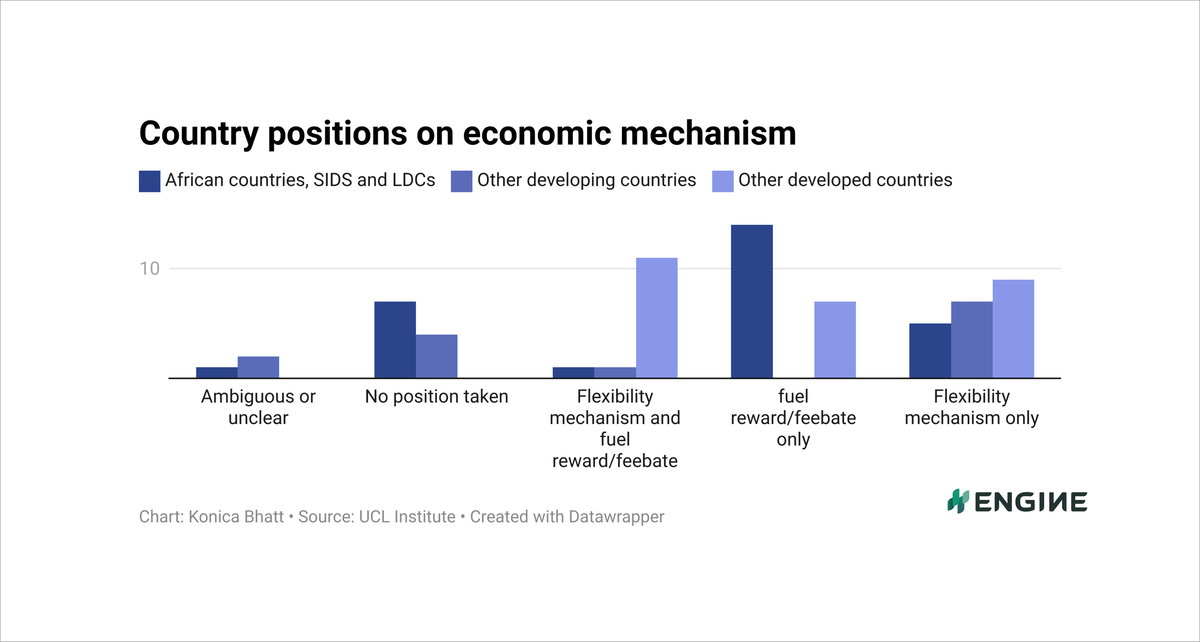All policy options ‘still on the table’ at the IMO – UCL
39 countries supported a universal greenhouse gas (GHG) levy while 15 opposed it at the MEPC 82 in London, according to research from University College London (UCL).
 PHOTO: Number of countries who voiced a position on the economic measure. UCL Institute.
PHOTO: Number of countries who voiced a position on the economic measure. UCL Institute.
The island nations and least developed countries have proposed a fixed carbon levy at $150/mtCO2e. This level is also backed by the Clean Shipping Coalition. The EU is supporting a carbon tax but has not specifically mentioned the level. Meanwhile, some South American and Southeast Asian nations and countries like China and India are opposing the implementation of a carbon tax.
"Despite the strong backing for this measure, no conclusion or decision was reached on whether this component would be included in the final strategy," noted the authors, including maritime expert and UCL associate professor Tristan Smith.
MEPC 82 outcome
Member states have drafted Chapter 5 of MARPOL Annex VI, which outlines regulations for the IMO’s net-zero framework. The regulations may incorporate mid-term measures, including both technical and economic mechanisms.
During discussions on economic measures at the IMO's GHG working committee, 21 member states across various income levels supported a flexibility mechanism without a feebate component. Another 21 countries, primarily lower- and higher-income nations, favoured only a feebate mechanism. 13 countries, mostly developed nations, endorsed a combination of both mechanisms, while 14 countries remained undecided.
Island nations, the EU, Japan, Korea, the Bahamas and the International Chamber of Shipping (ICS) consolidated their individual levy proposals and submitted them for consideration alongside the draft of MARPOL Annex VI Chapter 5.
The report noted that the text for technical measures "appeared more finalized" than for economic measures. Revenue distribution was also a topic of discussion at the meeting.
The technical measure under consideration at the IMO is a greenhouse gas fuel intensity (GFI) standard, which measures the total GHG emissions released into the atmosphere based on the amount of energy used by a ship. This standard is expressed in grams of CO2-equivalent per megajoule of energy (gCO2e/MJ).
What’s next for MEPC 83?
The next Maritime Environment Protection Committee (MEPC) meeting in March is expected to have a more focused agenda, according to the authors.
MEPC 83 will likely concentrate on setting regulatory goals, annual targets, and the methodology for calculating the GFI, including whether it will be based on a well-to-wake or adjusted tank-to-wake emission approach.
Discussions may also cover economic measures and alternative compliance mechanisms, such as flexibility options, feebate systems and surcharges on emissions exceeding the GFI limit.
Revenue distribution is another topic likely to be on the agenda, with a majority of member states favoring either training seafarers in zero- and near-zero technologies (14 countries) or rewarding the use of these technologies on ships (14).
A smaller group of countries (11) supports directing funds toward alternative fuels and technologies.
The Chapter 5 is expected to be adopted in the MEPC 84 in October next year so the regulations can be implemented by 2027.
Amending MARPOL
MARPOL can be amended either through consensus or voting among IMO member states. If no consensus is reached, the amendment process moves to a vote.
Under the voting procedure, only the 109 countries that have ratified MARPOL Annex VI out of the 176 member states are eligible to participate. An amendment requires the approval of two-thirds of those ratifying countries.
By Konica Bhatt
Please get in touch with comments or additional info to news@engine.online





